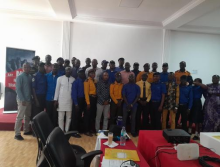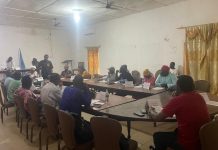By Sariba Manneh
The training of Law enforcement Officers on the critical issues that relate to National Referral Mechanisms (NRM) as well as on the general understanding on Trafficking in Persons (TIP) by NAATIP, ended at a local hotel.
The training which forms the third batch of law enforcement officers and participants to the event included members of The Gambia Police Force, Customs and Excise Department, Gambia Immigration Department, Drug Law Enforcement Agency -The Gambia, State Intelligence Services, and others. In total, 120 law enforcement officers from across the six administrative regions of the country, will be trained in the coming months.
Welcoming the participants, Tijan Faal, an investigator at NAATIP underscored the importance of the training in this day and age, and reminded them that combating human trafficking requires all hands on deck. Thus the more reason why they thought it wise to train law enforcement officers on this important matter. Faal described human trafficking as a serious threat that affects ‘our brothers and sisters’, thus the need to take a proactive stance to combat the practice.
“People are being trafficked outside The Gambia and into the country, likewise trafficked within the country,” he said.
He said human trafficking is classified as a source, destination and transit point for the human being who is the commodity in human trafficking.
“Victims of human trafficking are subjected to all forms of abuse both physical and sexual. They abuse and torture the victim which takes the person to the lowest degrading standards,” he said. He described the menace as a modern-day form of slavery and a violation of one’s fundamental human rights, noting this serious issue is second to only drug trafficking.
Isatou Dabo, the executive director of NAATIP took participants through the mandates of her Agency and some of the works it conducts in relation to trafficking in persons. She underscored the importance of the training which targets law enforcement officers on NRM, in view of the fact that not all cases of trafficking in persons come directly to the agency.
“Sometimes you come across these cases at entry or exit points such as borders, and at the Police Stations after night patrols have been conducted, or through special operations or either way,” Dabo said.
To that end, she explained that the issue of human trafficking has become one that requires the collective responsibility of everyone and that concerted efforts of all stakeholders is needed, saying Government has an obligation to protect the well-being of the citizenry.
Dabo disclosed that in human trafficking, there are so many allegations directed at the security supporting perpetrators with either documentation or compromising a case from being investigated.
“This is an opportunity and time for us to change the narratives different from what happens in reality. We know we have an obligation and we will do our best to support the national agency implement our mandate in our different law enforcement structures, and protect victims of trafficking be they Gambians or non-Gambian alike,” she said.
Sergeant Modou Lamin Sowe of Basse Police Station who is also a participant, dwelt on the significance of the training, saying human trafficking is complicated and most of the time, the practice is done in secret. He said exposing law enforcement agencies would hone their skills and knowledge in the fight against human trafficking.
“As an institution, we believe human trafficking needs a wider approach. The police alone cannot do it and that is why all stakeholders need to come on-board, because the relevant skills our officers will be exposed to, will help them in their daily work,” Sgt. Sowe said.
Dwelling on the commitment of the police in combating trafficking in persons, Sgt. Sowe continued to say that when cases are reported, they ensure the matter is taken to court so that the perpetrators are dealt with accordingly.
A total of 120 law enforcement officers from across the six administrative regions of the country, are expected to receive training on human trafficking in the coming months, by NAATIP.




















